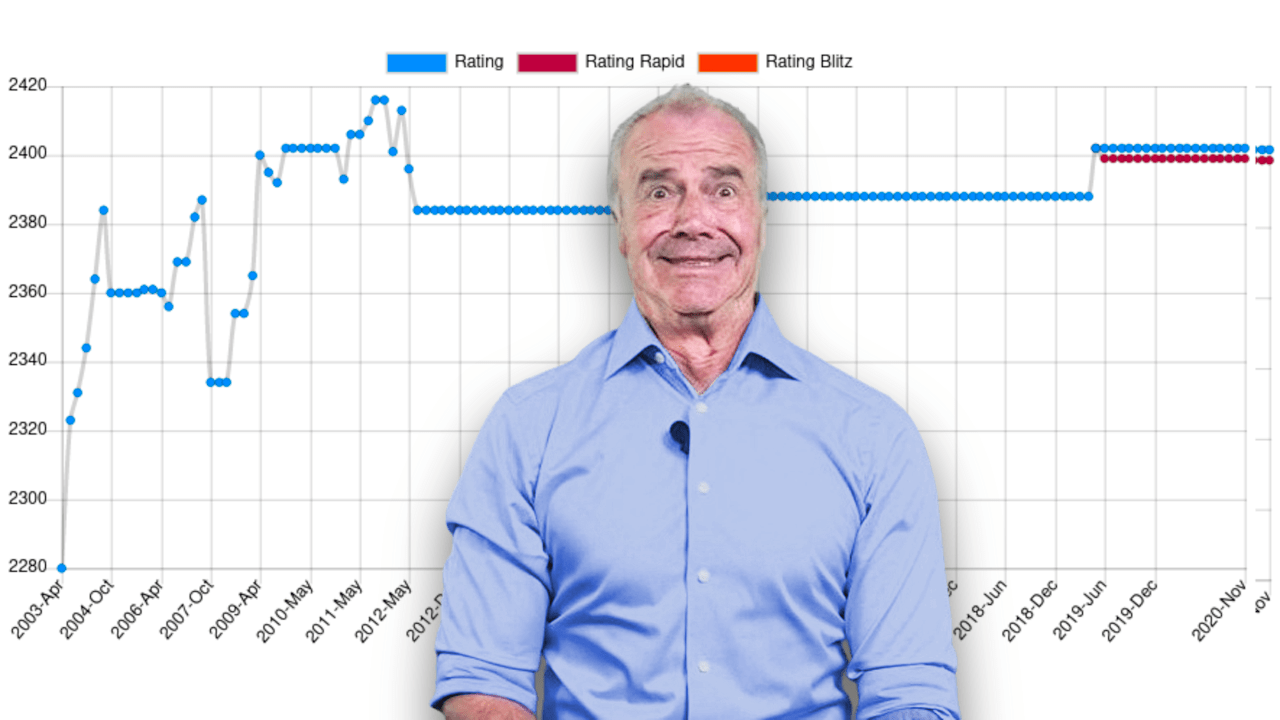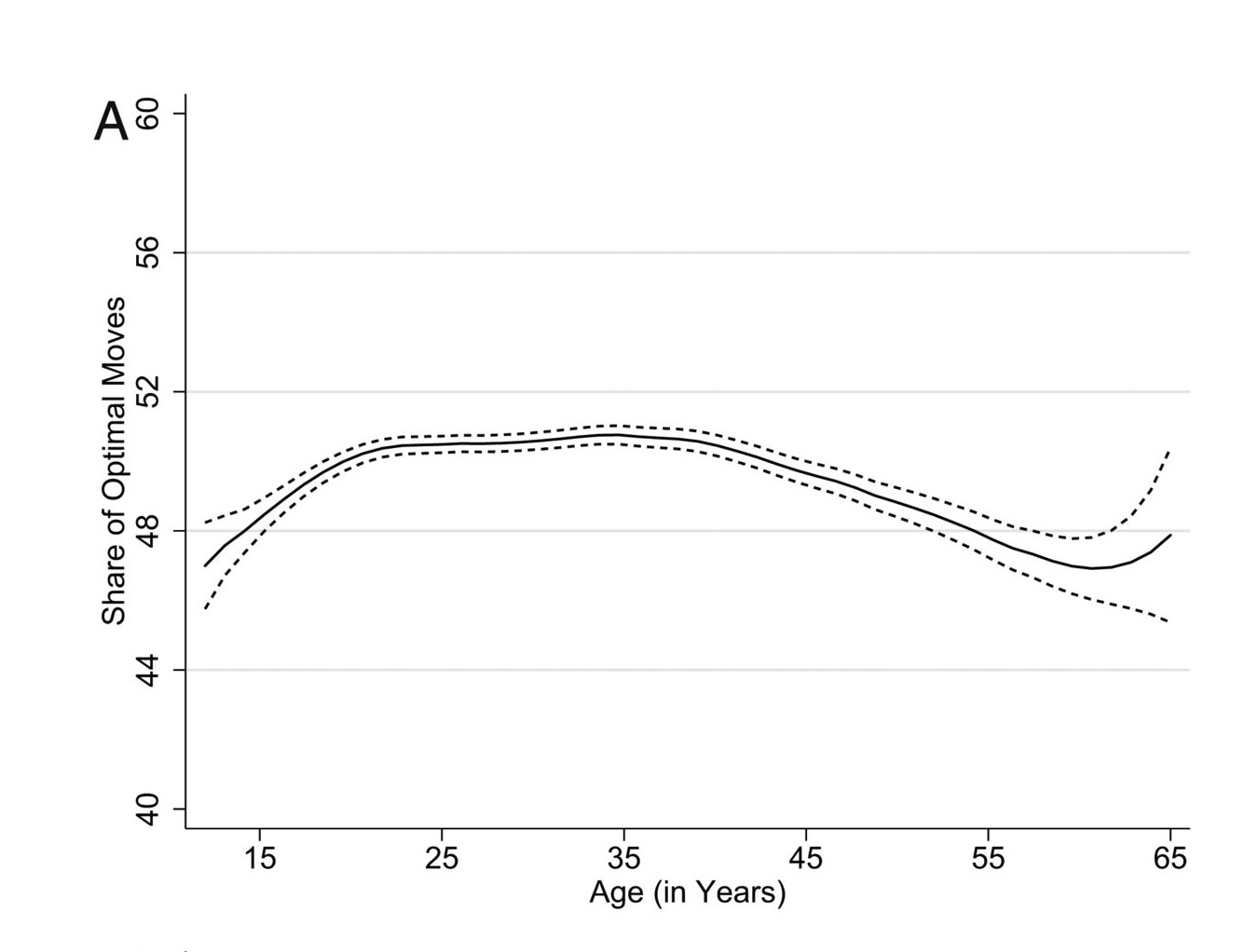
At What Age Do Chess Players Peak?
There was a study published last month by PNAS titled "Life Cycle Patterns of Cognitive Performance over the Long Run" which looked at chess as a way to measure cognitive performance. The study looked at the move-by-move performance of top professional chess players and compared their moves to Stockfish 8. Peter Doggers wrote an article that goes into more detail about how the study was conducted, titled "Top Chess Players Peak Between 35 and 45, Research Shows." The most interesting graph in the paper depicts the share of optimal moves by age.

The paper suggests that a player's performance sharply increases until age 20, gradually improves until age 35, and then begins to decline. The next logical progression that aspiring chess players make is to say, "Well, does this mean that I can't improve after age 35?"
Study Design
There is a big difference between the players in this study and the remaining 99.9%+ of the chess-playing population - playing strength. I did some research on over 400 players in The Effect Of Age On Chess Improvement and found that a player's rating is a stronger predictor of rating gains than age was. I don't think the PNAS study can directly apply to most chess players because these super-grandmasters are a much different population of players.
In this article, we will attempt to figure out at what age chess players peak based on their current rating. Instead of using individual moves to determine player performance, we will make the assumption that a player's 12-month rating change correlates with their performance. This should be a reasonable assumption considering all ages are being judged on the same metric, and we don't expect any significant inflation or deflation in rating pools over a 12-month stretch (Chess.com monitors this). The data going into this analysis is based on 400+ players in the ChessGoals study and has the usual caveats about survey data. I have done my best to spot-check and clean the data to be used for analyses.
Methods
I have stratified the players into seven age categories (<20, 20-29, 30-39, 40-49, 50-59, 60-69, 70+) and six rating categories (novice, beginner, intermediate, intermediate 2, advanced, expert). The rating categories have the following criteria:
- Novice (<800 rating)
- Beginner (800-1099 rating)
- Intermediate (1100-1399 rating)
- Intermediate 2 (1400-1699 rating)
- Advanced (1700-1999 rating)
- Expert (2000-2299 rating)
Next, I created a model that predicts rating gain based on age and hours spent per week on chess. Since I have found the optimal hours per week is ~20 hours for most players, we will use that value for this analysis. Now we can figure out at what age, on average, each rating range peaks while spending 20 hours per week.
Results
The results are very promising for players looking to improve! They definitely do not show that the average player peaks at age 35. Keep in mind this is based on survey data, and also that it's an average expected annual rating gain. You could be gaining more or less in a given year based on other factors not considered. This table shows the average expected rating gain by each combination of rating category and age category.

At all rating levels, we see a decrease in expected gain over time. This does not mean the players have peaked though until the values decrease to 0 and go into the negative territory. For players rated under 1400, it appears that there are usually points to be gained with enough time and effort! This is very encouraging news.
In the Intermediate 2 (1400-1699) range, we start to see a peak on average at around age 73. Some players will peak earlier or later, but this starts to suggest that at higher ratings we peak earlier in terms of our chess performance. Advanced (1700-1999) players, on average, peak at around age 58. This shows a continuation of the trend, and we see similar results for expert (2000-2299) players peaking at age 50 on average.
Conclusion
Don't be discouraged, there is hope after age 35! A steady diet of playing games, analyzing them, solving your puzzles, completing strategy and endgame lessons, with a bit of opening review for dessert, will give you a great shot at improving at almost any age and rating. Even if you see a negative value in the table above, keep in mind these are only averages. Players can gain a couple of hundred points above or below these averages. Keep chess fun, and you'll have a hobby you can enjoy for life.




